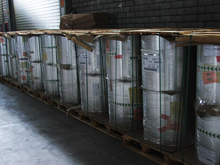Today, a world without plastics cannot be imagined. Whether you regard soft
fibers, pipelines, foils for packaging, automobile parts or medical products:
Plastics have long since become indispensable in day-to-day applications, and
their application area is growing steadily. This is because these oil-based
allrounders are light weight, corrosion resistant as well as easily machinable
and malleable.
New applications for synthetic materials are under continual development or
being put to actual practice each day.


The basic raw material of synthetics is well-known and much sought after: petroleum! Refineries turn petroleum into gasoline, diesel and heavy fuel oil as well as into naphtha. The latter is most important for producing plastics. Naphtha comprises a mixture of various hydrocarbon chains and rings. GP-Polymere receives this starting material from the neighboring Shell refinery by pipeline and – to a lesser extent – by ship on the river Rhine. On the GP production site the first step is initiated to turn a crude oil derivative into plastics.
In a technical process called ”cracking”, Naphtha is heated to circa 850 degrees Celsius. The heat causes the large hydrocarbon chains to break apart, thus yielding small gas molecules. The main fragments produced by this process are ethylene and propylene. Both are monomers, i.e., useful and essential building blocks in polymer chemistry. GP has two large cracking plants called MG4 and MG6. It is quite impossible to produce synthetics without such crackers. Therefore a cracker can be regarded as the ”heart” of the production site.